

Idee e teorie filosofiche più rilevanti dell'ultimo secolo. La mappa interattiva di storia della filosofia fatta con migliaia di citazioni. Immaginiamo un grande appassionato di filosofia che prenda “l’Abbagnano“, un manuale di filosofia contemporanea, molti libri d’autore, e si metta a compilare—più per chiarire alcune idee a se stesso che per fare un favore agli altri—una singolare “mappa” di storia della filosofia da Eraclito, Epicuro, Epitteto, fino a Deleuze e oltre, passando per Cartesio, Kant, Kierkegaard, Schopenhauer e Nietzsche.

Una mappa enorme, fatta di citazioni e concetti chiave dei filosofi disposti in ordine cronologico ma anche collegati in base alle affinità e alle divergenze. Bene, quell’appassionato esiste, solo che non ha usato l’Abbagnano perché è un designer turco. Deniz Cem Önduygu è il grafico di Istanbul che ha realizzato La storia della filosofia riassunta e visualizzata. Si tratta di una timeline interattiva della storia delle idee. The History of Philosophy - Summarized & Visualized. This is my summary of the history of Western philosophy showing the positive/negative connections between some of the key ideas/arguments/statements of the philosophers.
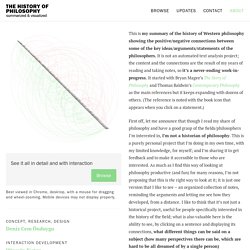
It is not an automated text analysis project; the content and the connections are the result of my years of reading and taking notes, so it’s a never-ending work-in-progress. It started with Bryan Magee’s The Story of Philosophy and Thomas Baldwin’s Contemporary Philosophy as the main references but it keeps expanding with dozens of others. (The reference is noted with the book icon that appears when you click on a statement.) The Meaning of Life According to Different Philosophies - Adioma. Can the meaning of life be told in a word?
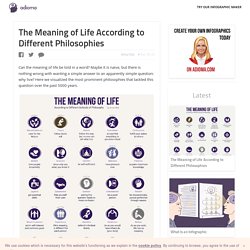
Maybe it is naive, but there is nothing wrong with wanting a simple answer to an apparently simple question: why live? Here we visualized the most prominent philosophies that tackled this question over the past 5000 years. Create an infographic like this on Adioma All philosophies on the meaning of life seem to fall into one of the four groups: life has an objective meaning;life has a subjective meaning;life has no meaning;life has a supernatural/unexplainable meaning. The philosophies of the East and West also follow a pattern: Easterners think in terms of “we”, the community, while Westerners think in terms of “I”, the individual. Philosophie - (le B.A.BA) Western Philosophy. Introduction to Philosophy/The Branches of Philosophy. The Branches of Philosophy[edit] Western philosophy can be divided into six branches that have assumed various importance over time.
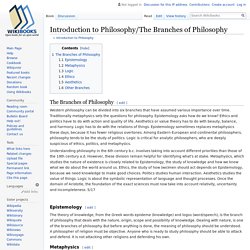
Traditionally metaphysics sets the questions for philosophy. Epistemology asks how do we know? Ethics and politics have to do with action and quality of life. Aesthetics or value theory has to do with beauty, balance, and harmony. Understanding philosophy in the 6th century b.c. involves taking into account different priorities than those of the 19th century a.d. Epistemology[edit] The theory of knowledge, from the Greek words episteme (knowledge) and logos (word/speech), is the branch of philosophy that deals with the nature, origin, scope and possibility of knowledge. [edit] The Basics of Philosophy: A huge subject broken down into manageable chunks. Philosophers and Their Works.
Stanford Encyclopedia of Philosophy. Abduction (Igor Douven) Abelard [Abailard], Peter (Peter King and Andrew Arlig) Abhidharma (Noa Ronkin) abilities (John Maier) Abner of Burgos (Shalom Sadik) Abrabanel, Judah (Aaron Hughes) abstract objects (Gideon Rosen) accidental properties — see essential vs. accidental properties action (George Wilson and Samuel Shpall) action-based theories of perception (Robert Briscoe and Rick Grush) action at a distance — see quantum mechanics: action at a distance in actualism (Christopher Menzel) actualism and possibilism in ethics (Travis Timmerman and Yishai Cohen) adaptationism (Steven Hecht Orzack and Patrick Forber) Addams, Jane (Maurice Hamington) Adorno, Theodor W.
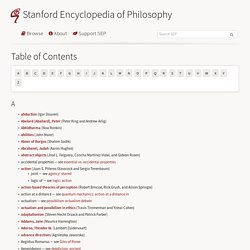
B [jump to top] C [jump to top] D [jump to top] Damian, Peter (Toivo J. E [jump to top] Topical Arrangement - THE SOPHIA PROJECT. Paolo Dai Prà. Concepts. Humanities. Philomag.com par Philosophie Magazine. Chaosmotics Italia. La-Philosophie.com : Cours, Résumés & Citations – Cours de philosophie gratuits, citations et articles de recherche, pour le bac, la prépa, la fac ou le plaisir. Cours de philosophie en ligne et en téléchargement. Encéphi. Philosophie, Histoire, Sociologie. Filosofia Comparata. Thèmes Philosophie. Philosophie.
About Philosophy & Philisophers. FILO. Learn Philosophy, from the Ancients to the Moderns, with 350 Animated Videos. Philosophy is not an idle pursuit of leisured gentlemen and tenured professors, though the life circumstances of many a philosopher might make us think otherwise.

The foremost example of a privileged philosopher is Marcus Aurelius, famous expositor of Stoicism, and also, incidentally, Emperor of Rome. Yet we must also bear in mind that Epictetus, the other most famous expositor of Stoicism, whom Aurelius quotes repeatedly in his Meditations, was born a slave. Against certain tendencies of modern thinking, we might hazard to believe that both men shared enough common human experience to arrive at some universal principles fully applicable to everyday life. Stoicism, after all, is nothing if not practical. Consider, for example, the emperor’s advice below—how challenging it might be for anyone, and how beneficial, not only for the individual, but—as Aurelius makes plain—for everyone.
The material is out there. Related Content: An encyclopedia of philosophy articles written by professional philosophers. Vocabulaire philosophique. Guide to Philosophy on the Internet (Suber) Welcome to my collection of online philosophy resources.
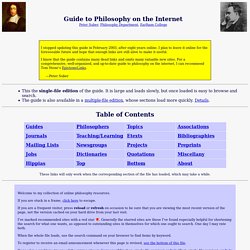
If you are stuck in a frame, click here to escape. If you are a frequent visitor, press reload or refresh on occasion to be sure that you are viewing the most recent version of the page, not the version cached on your hard drive from your last visit. Philosophy Index. Chronological List of Published Entries. Imaginaire servante de la raison. Remontant aux sources du Transhumanisme, nous avions rencontré le jeune philosophe et théologien italien, Jean Pic de la Mirandole (1463-1494), dont l’entreprise philosophique et théologique visait à concilier le Platonisme à l’Aristotélisme, le Thomisme au Scotisme, dans une unité transcendantale divine.
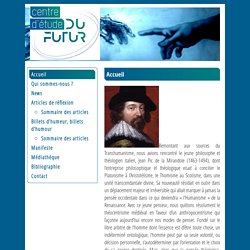
Sa nouveauté résidait en outre dans un déplacement majeur et irréversible qui allait marquer à jamais la pensée occidentale dans ce qui deviendra « l’Humanisme » de la Renaissance. Avec ce jeune penseur, nous quittons résolument le théocentrisme médiéval en faveur d’un anthropocentrisme qui façonne aujourd’hui encore nos modes de penser. Symbolic Logic. Symbolic logic is the method of representing logical expressions through the use of symbols and variables, rather than in ordinary language.
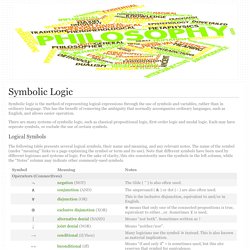
This has the benefit of removing the ambiguity that normally accompanies ordinary languages, such as English, and allows easier operation. There are many systems of symbolic logic, such as classical propositional logic, first-order logic and modal logic. Each may have seperate symbols, or exclude the use of certain symbols. Logical Symbols The following table presents several logical symbols, their name and meaning, and any relevant notes. Logic, metaphor, apocalypse. Autoréférence. Morale. Monisme. Autoportrait subjectif du physicien et philosophe moniste Ernst Mach, censé illustrer l'unité du « moi » et du monde.
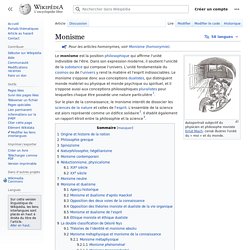
Values. Explanations > Values About values | Historical values | Research on values | So what? Values is a confusing word that often gets confused with 'value' as in the value you get from buying a cheap, but well-built house. Values are, in fact powerful drivers of how we think and behave. About values. Racism is baked into the structure of dialectical philosophy. It is by now well known that some of the greatest modern philosophers held racist views. John Locke (1632-1704), David Hume (1711-76), Immanuel Kant (1724-1804), G W F Hegel (1770-1831) and many others believed that Black and Indigenous peoples the world over were savage, inferior and in need of correction by European enlightenment.
No serious philosopher today defends these explicitly racist views but, with good reason, they continue to study the writings of these authors. In order to hold on to the philosophical insights, scholars tend to make a distinction between the individual racism and the philosophical systems. Hegel might have been wrong for his racist writings about Africans and others, but that doesn’t tell us anything about his speculative metaphysics. Or so the argument goes. Entéléchie: la conquête de soi. Par Camille Loty Malebranche Nous avons présenté l'homme téléologique comme le rêveur actif qui se projette, aujourd'hui nous poursuivons avec cette suite cohérente de la téléologie qu'est l'entéléchie assumée sous l'appellation de "L'homme entéléchique".
L'homme entéléchique est le conquérant de soi, un travailleur de l'être dont la discrétion des conquêtes sans klaxon ni gyrophare, laisse insensibles les cohues mais touche la petite élite dont le Christ disait qu'elle est celle qui, prenant la route et la porte étroites, parvient au vrai sommet, loin des montagnes de Sisyphe et de Prométhée, symboles des misères bouclant les fausses élévations nées du vide axiologique. C’est vrai que le pillage et la séquestration des biens communs par une minorité d’oligarques qui aliènent les foules majoritaires par leur exhibitionnisme de richissimes, semblent procurer un sens à l’ego narcissique des prédateurs.
Le vide métaphysique du personnalisme. Le meilleur des mondes. Comme on va le voir, arriver au concept de « monde » qui nous est familier n’est pas simple et l’on voit l’effort spéculatif qu’à du coûter la saisie d’une totalité comme synthèse de deux autres catégories de la quantité à savoir la pluralité et l’unité.Jean-Jacques Rousseau rappellera à Voltaire l'aspect contraignant de la démonstration de Leibniz : « Ces questions se rapportent toutes à l'existence de Dieu. (...)
Eloge de la fuite (1976) Henri Laborit. L’éloge de la fuite aurait d’abord dû être l’autobiographie d’Henri Laborit. L’homme aurait pu se décrire en ces termes : médecin chirurgien et biologiste, philosophe du comportement animal et humain. Trop facile. Pourquoi quelque chose plutôt que rien? Philosophy & Stuff. Esopedia. Filosofia Antica. Philosophie. Définition de l'amour, philia, éros, agapè, storgê.
En effet dans les mots “je t’aime” il peut souvent y avoir bien des confusions, des attentes et des sentiments différents ! Anaximander. Pre-Socratic Ionian philosopher Anaximander (; Greek: Ἀναξίμανδρος Anaximandros; c. 610 – c. 546 BC)[4] was a pre-Socratic Greek philosopher who lived in Miletus,[5] a city of Ionia (in modern-day Turkey). He belonged to the Milesian school and learned the teachings of his master Thales. He succeeded Thales and became the second master of that school where he counted Anaximenes and, arguably, Pythagoras amongst his pupils.[6] Little of his life and work is known today. According to available historical documents, he is the first philosopher known to have written down his studies,[7] although only one fragment of his work remains. Héraclite. Heraclitus. Pre-Socratic Greek philosopher Due to the oracular and paradoxical nature of his philosophy, and his fondness for word play, he was called "The Obscure" even in antiquity.
He wrote a single work, On Nature, but the obscurity is made worse by its remaining only in fragments. His cryptic utterances have been the subject of numerous interpretations. He's been seen variously as a "material monist or a process philosopher; a scientific cosmologist, a metaphysician, or mainly a religious thinker; an empiricist, a rationalist, or a mystic; a conventional thinker or a revolutionary; a developer of logic or one who denied the law of non-contradiction; the first genuine philosopher or an anti-intellectual obscurantist. Il “Panta rei” di Eraclito: accettare la vita in continuo mutamento. Stoicism and Pain Management: 4 Techniques Practiced By Marcus Aurelius. This is a guest post by Donald Robertson. Donald is a cognitive-behavioral psychotherapist, trainer, and writer. Robertson has been tirelessly researching Stoicism and applying it in his work for twenty years.
He is also the author of the remarkable new book on Marcus Aurelius, How To Think Like a Roman Emperor The Roman emperor Marcus Aurelius knew about using Stoicism to cope with chronic pain and illness. He had personal experience of doing so. Tetrapharmakon : un remède épicurien. Le dialogue socratique: penser soi-même à travers l’Autre. L’amour selon Platon et Spinoza. « Qu’est-ce que l’amour ? Pythagoras & Sacred Geometry. Three Degrees of Wisdom: Epicureanism, Stoicism, and Neoplatonism. Le néoplatonisme. Il Neoplatonismo e le sue origini. Alle origini della filosofia cristiana - Lezione 27 Zanichelli. Transcendentals. Žižek on OOO. 40 Belief-Shaking Remarks From a Ruthless Nonconformist. La precisione in filosofia - IMPRESSIONS - Rivista digitale di critica della cultura. Dalla parte del lupo. Cosa sono i pregiudizi – Filosoφicamente. Points de vues philosophiques sur la vérité. LA VÉRITÉ ET LA CROYANCE. Some Moral Dilemmas.
How to Make Our Ideas Clear. Qu’est-ce que la causalité ? Saint Esprit: soumis au déterminisme scientifique? Ipostatizzare, etimologia e significato - Una parola al giorno. Unificazione generale della fisica. Base de données de textes philosophiques. History of Philosophy without any gaps. A Zoomable Graph of the History of Philosophy. Figure dell'immaginario. PENSEURS et PHILOSOPHES - Les devenirs de la philosophie à Paris 8. PHILOSOPHIE. Philosophy. Philosophie. Philosophy. Philosophy and Ethics. Philosophy and Logic.
Philosophy. Philosophie. Philosophy. PHILOSOPHIE. Philsophy. La filosofia al liceo è un relitto culturale. Stanford Encyclopedia of Philosophy. Filosofia Moderna. MONTAIGNE - Les Essais. Leibniz, penseur complexe de l’infini. Philosophy since the Enlightenment, by Roger Jones. Philosophy. ESTHÉTIQUE PHILOSOPHIQUE. Lexique.